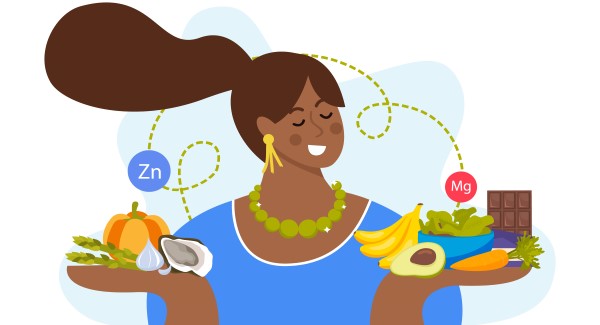
Diet is an important aspect of PCOS (polycystic ovarian syndrome) management. When trying to decide what foods to eat, it’s important to break them down into groups. Here’s a guideline to help you maintain a good PCOS diet.
1. Lean protein
These keep you full for longer and aid in weight loss. Think tuna, cod, skinless chicken and turkey breast, tofu, beans, peas, etc.
2. Complex carbohydrates
Go for foods that are high in fibre, which regulates insulin levels and keeps you full. Opt for whole grains (oats, brown rice), legumes (beans, peas, lentils), and sweet potatoes.
3. Heart-healthy fats
Fat is vital for proper brain and heart function, vitamin absorption, and overall hormone production. Go for pumpkin seeds, sesame seeds, avocados, extra-virgin olive oil, walnuts, almonds, etc.
4. Antioxidants
These help in reducing inflammation in your body. Try grapes, cranberries, spinach, tomatoes, carrots, peppers, eggplant, lemon, turmeric, ginger, dark chocolate, etc.
PCOS: what are the food items to avoid?
Just as we have foods that aid PCOS management, we also have foods to avoid. Here are the top foods to steer clear of if you are dealing with PCOS:
1. Processed, refined, or simple carbohydrates
Women managing PCOS don’t process glucose (sugar) correctly due to high insulin levels. Try to limit refined carbohydrates like white bread, regular pasta, white rice, breakfast cereal, etc.
2. Unhealthy fats
Both saturated and trans fats increase inflammation in the body. Limit foods like red or processed meat, butter, cheese, milkshakes, French fries, doughnuts, and other fried foods.
3. Sugar-filled drinks
Many convenient beverages are packed with refined sugar, which may negatively affect your blood glucose levels. A few examples include soda, fruit juice, smoothies, or sweetened coffee and tea beverages.
4. Processed foods
Like drinks, overly processed foods often contain high amounts of sugar and unhealthy fats. Examples include candy, cookies, cakes, pastries, ice cream, etc.
5. Alcohol
One of the long-term side effects of PCOS is an increased risk of fatty liver disease. Since alcohol is a direct toxin to the liver, it’s recommended to avoid it whenever possible.




This was helpful
Thank you.